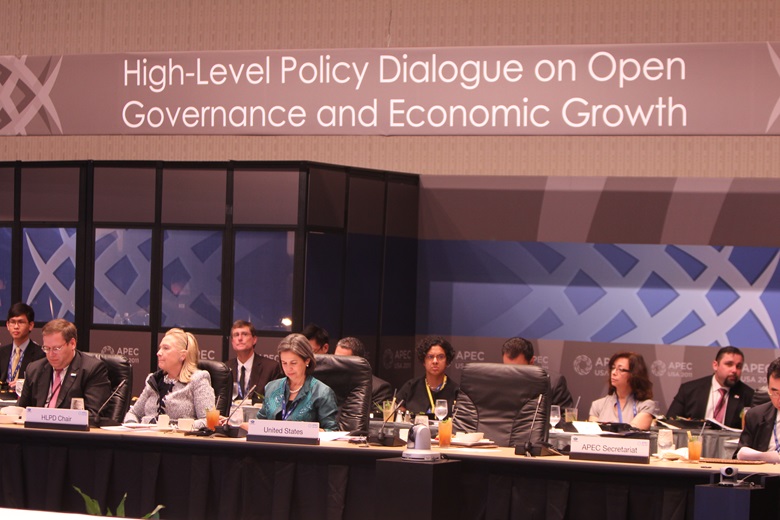2011 APEC High Level Policy Dialogue on Open Governance and Economic Growth

We, the APEC Ministers, under the chairmanship of U.S. Secretary of State Hillary Rodham Clinton, held a High Level Policy Dialogue on Open Governance and Economic Growth in Honolulu, Hawaii, on November 11, 2011. We welcomed participation in the Dialogue by representatives from business, academia, and non-governmental and labor organizations.
Transparency and open governance are a critical element of long-term economic competitiveness, leading to sustainable economic growth and prosperity. We welcome the efforts of APEC members so far to enhance public trust by combating corruption and by committing to transparent, fair, and accountable governance. APEC should continue to actively address good governance issues as a key priority. Good governance will in turn spur high-quality economic growth by fostering and sustaining the entrepreneurial spirit that nurtures innovation, enhances competitiveness, reduces market distortions and promotes trade and long-term investment.
Promoting Open Governance: We appreciate the ongoing work of the Organisation for Economic Cooperation and Development (OECD) to introduce recommendations to its membership regarding key measures to improve regulatory policy and governance. Those measures draw upon the APEC-OECD Integrated Checklist on Regulatory Reform and its recommendations regarding regulatory quality, competition policy, and market openness. We instruct the Economic Committee to continue its work to promote more open and effective governance across the APEC region by addressing best practices in public sector governance, regulatory reform, corporate law and governance and competition policy.
We recall our commitment to APEC’s Transparency Standards agreed to in 2002, as well as the nine sectoral standards agreed to in 2003 and 2004. The ability for businesses, especially small and medium-sized exporters, to have access to laws, regulations, procedures and administrative rulings, and also to meaningfully participate in their development, is critical to strengthening regional economic integration, expanding trade and investment flows, and creating jobs in the region.
We welcome the recent launch of the Open Government Partnership and encourage eligible APEC economies that are not yet members to take the necessary steps to enable membership in this important initiative to promote transparency, empower citizens, fight corruption, and harness new technologies to strengthen governance.
Encouraging Ethical Business Practices: We applaud the decision of the APEC SME Ministers at Big Sky, Montana in May 2011 to endorse the Kuala Lumpur Principles for Medical Device Sector Codes of Business Ethics. This set of principles for the region’s medical devices industry is the first of its kind, and will improve the quality of patient care, encourage innovation, and promote the growth of SMEs that produce medical devices. We also congratulate the work of the APEC SME Working Group in establishing voluntary sets of ethics principles for the biopharmaceutical sector (the Mexico City Principles) and the construction and engineering sector (the Hanoi Principles). We endorse these three sets of principles and look forward to further APEC efforts to ensure that these principles have a practical impact for small and medium-sized companies.
Fighting Corruption: We applaud the efforts of the Anti-Corruption and Transparency Experts’ Working Group (ACTWG) to uphold public integrity by developing principles related to financial asset disclosure for officials, and to launch an APEC partnership with the private sector to combat corruption and illicit trade, including dismantling cross-border illicit networks. We ask that the ACTWG report to Ministers on progress on these initiatives in 2012.
We recall the instruction of the APEC Leaders in Yokohama in 2010 calling on all APEC economies to report on their implementation of previously-agreed APEC anti-corruption and transparency policies. We look forward to each economy presenting a full and comprehensive report on its progress by the end of 2014, to be preceded by interim reports by economies in 2012 and 2013 covering the full range of their APEC anti-corruption commitments and associated actions taken. We also call upon APEC member economies to implement the UN Convention against Corruption, including by reinforcing transparency and inclusiveness in the conduct of their respective reviews.
Conclusion: This Dialogue has reaffirmed and reinforced our commitment to combating corruption and operating transparent, fair, and accountable governments. We instruct our officials to match this commitment with further actions, including capacity-building activities for developing economies, in support of this work. We expect to review progress toward realizing these objectives under Russia's chairmanship in 2012.
# # # #

